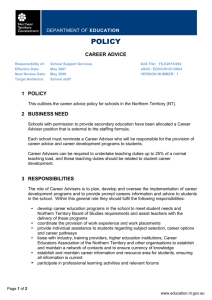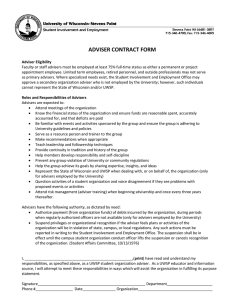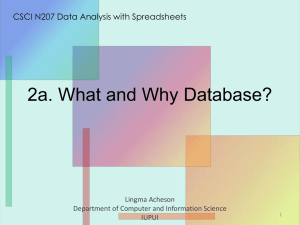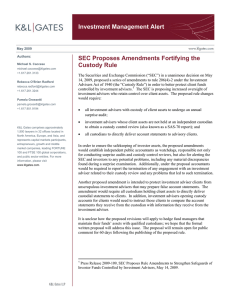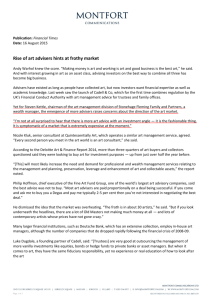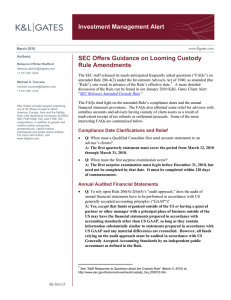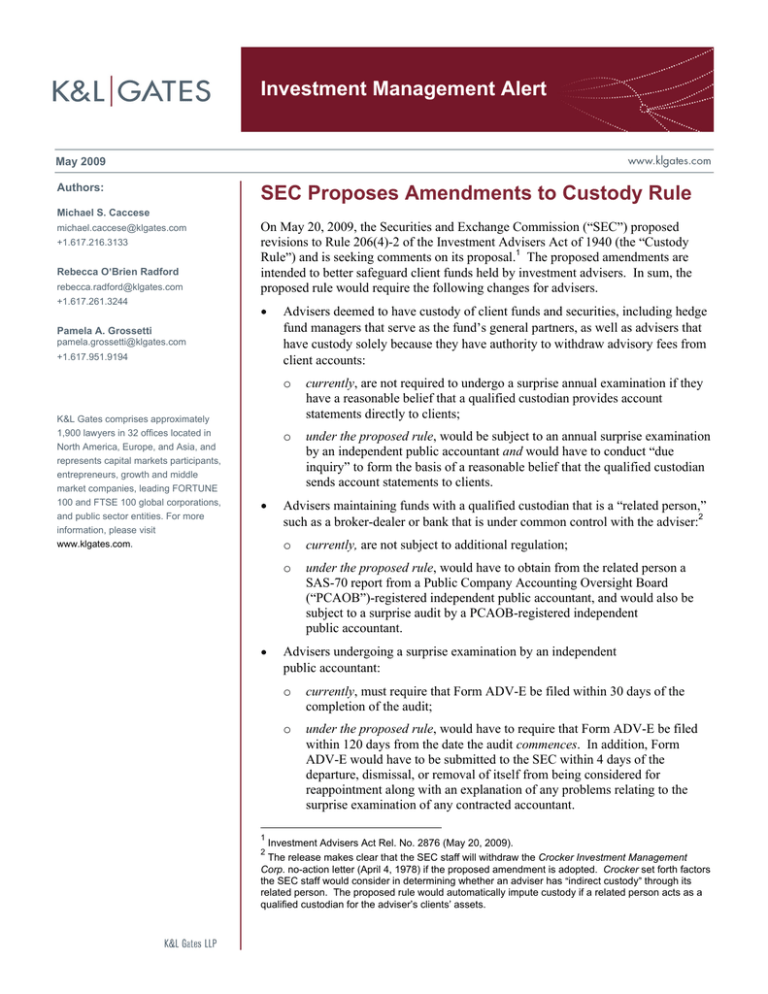
Investment Management Alert
May 2009
Authors:
SEC Proposes Amendments to Custody Rule
Michael S. Caccese
michael.caccese@klgates.com
+1.617.216.3133
Rebecca O Brien Radford
rebecca.radford@klgates.com
On May 20, 2009, the Securities and Exchange Commission ( SEC ) proposed
revisions to Rule 206(4)-2 of the Investment Advisers Act of 1940 (the Custody
Rule ) and is seeking comments on its proposal.1 The proposed amendments are
intended to better safeguard client funds held by investment advisers. In sum, the
proposed rule would require the following changes for advisers.
+1.617.261.3244
Advisers deemed to have custody of client funds and securities, including hedge
fund managers that serve as the fund s general partners, as well as advisers that
have custody solely because they have authority to withdraw advisory fees from
client accounts:
Pamela A. Grossetti
pamela.grossetti@klgates.com
+1.617.951.9194
K&L Gates comprises approximately
1,900 lawyers in 32 offices located in
North America, Europe, and Asia, and
represents capital markets participants,
entrepreneurs, growth and middle
market companies, leading FORTUNE
100 and FTSE 100 global corporations,
and public sector entities. For more
information, please visit
www.klgates.com.
o
currently, are not required to undergo a surprise annual examination if they
have a reasonable belief that a qualified custodian provides account
statements directly to clients;
o
under the proposed rule, would be subject to an annual surprise examination
by an independent public accountant and would have to conduct due
inquiry to form the basis of a reasonable belief that the qualified custodian
sends account statements to clients.
Advisers maintaining funds with a qualified custodian that is a related person,
such as a broker-dealer or bank that is under common control with the adviser:2
o
currently, are not subject to additional regulation;
o
under the proposed rule, would have to obtain from the related person a
SAS-70 report from a Public Company Accounting Oversight Board
( PCAOB )-registered independent public accountant, and would also be
subject to a surprise audit by a PCAOB-registered independent
public accountant.
Advisers undergoing a surprise examination by an independent
public accountant:
1
o
currently, must require that Form ADV-E be filed within 30 days of the
completion of the audit;
o
under the proposed rule, would have to require that Form ADV-E be filed
within 120 days from the date the audit commences. In addition, Form
ADV-E would have to be submitted to the SEC within 4 days of the
departure, dismissal, or removal of itself from being considered for
reappointment along with an explanation of any problems relating to the
surprise examination of any contracted accountant.
Investment Advisers Act Rel. No. 2876 (May 20, 2009).
The release makes clear that the SEC staff will withdraw the Crocker Investment Management
Corp. no-action letter (April 4, 1978) if the proposed amendment is adopted. Crocker set forth factors
the SEC staff would consider in determining whether an adviser has indirect custody through its
related person. The proposed rule would automatically impute custody if a related person acts as a
qualified custodian for the adviser s clients assets.
2
Investment Management Alert
Summary of Proposed Changes
Advisers with custody. The proposed rule would
require all registered investment advisers with
custody of client assets to undergo an annual
surprise examination by eliminating the current
exceptions for advisers (i) whose client assets are
held by qualified custodians that provide account
statements directly to the adviser s clients; and
(ii) that act as general partners to pooled investment
vehicles that distribute audited financial statements
to their limited partners within 120 days of the end
of the fiscal year.3 In addition, privately offered
securities would become subject to the
surprise examination.
The proposal also would (i) eliminate advisers
option to deliver quarterly account transaction
reports directly to clients; and (ii) require advisers to
conduct due inquiry to form the basis of a
reasonable belief that reports are sent by the
qualified custodian to the adviser s clients. The SEC
states that the provision of reports directly to clients
by the qualified custodian would better assure
their integrity.
Advisers that act as general partners to pooled
investment vehicles would continue to be excepted
from the requirement to have a qualified custodian
send account statements to limited partners if the
pool is audited annually, distributes audited financial
statements to the limited partners within 120 days of
fiscal year end, and upon liquidation distributes
audited financial statements to the limited partners
promptly after the audit s completion. Even though
such advisers would be exempt from the requirement
to have qualified custodians send account statements
to the limited partners, they would still be required
to undergo an annual surprise examination.
Advisers are currently required to give notice to
clients upon opening of a custodial account on the
client s behalf. The proposed rule would require
advisers to include in this notice a statement urging
clients to compare their account statements from the
custodian with those from the adviser.
3
We note that the proposal is silent on issues related to
private funds of funds. We anticipate the treatment of funds of
funds to be raised in comments to the proposal.
Related persons as qualified custodians. Under
the proposed rule, if an independent custodian does
not hold client assets, the adviser would be deemed
to have custody and would have to obtain from the
related person annually an internal control report
that includes an opinion from an independent public
accountant registered with the PCAOB. The
internal control report would have to contain a
description of control objectives, controls,
accountant s tests, and the results of those tests.
The adviser would have to retain a copy of the
internal control report for five years from the end of
the fiscal year in which it is issued. Because the
adviser s custody would have to be in connection
with its advisory services, an adviser would not be
deemed to have custody of client assets held by a
related qualified custodian with respect to which the
adviser does not provide investment advice.
In addition, when an adviser or related person
serves as qualified custodian, the adviser s requisite
surprise annual examination would have to be
performed by an accountant registered with the
PCAOB, in accordance with the rules of the
PCAOB.
Form ADV-E. The proposed rule would require
significant changes to Form ADV-E, including that
Form ADV-E be filed by the independent public
accountant within 120 days of the date the surprise
examination commences. The adviser would have
to have a written agreement with the accountant that
requires it to submit the Form ADV-E and report to
the SEC material discrepancies within one business
day. Such agreement also would have to provide
for the submission of Form ADV-E by the
accountant within four business days following the
termination of the agreement or the accountant s
resignation, dismissal, or removal (including by
itself), accompanied by a statement detailing any
problems with the examination scope or procedure
that contributed to the departure.
Other proposed changes. In addition, the
proposed rule would require amendments to Form
ADV designed to provide the SEC and the public
with greater information on how advisers are
maintaining client funds. More specifically, the
proposed rule would amend Item 7 of Part 1A to
require, instead of permit, an adviser to report all
related persons who are broker-dealers and identify
May 2009
2
Investment Management Alert
those which serve as qualified custodians with
respect to the clients funds. Item 9 of Part 1A
would require advisers and related persons with
custody to report the amount of client assets and
number of clients for which they have custody.
Schedule D of Form ADV would include additional
items requiring identification of accountants that
perform audits, surprise examinations, and internal
control reports and of related persons that serve as
qualified custodians.
an accountant s termination statement should
be made publicly available;
the SEC should simply require that an
independent qualified custodian hold
client assets;
the SEC should continue to exempt advisers of
pooled vehicles audited at least annually from
the surprise examination requirement;
it is feasible to require advisers to obtain a
surprise examination with respect to privately
offered securities; and
Conclusion
Recently, the SEC has brought several enforcement
actions against investment advisers and brokerdealers alleging fraudulent conduct. With these
amendments, the SEC seeks to prevent further
misuse of client assets and allow for earlier detection
of fraudulent activities. In order to best accomplish
its objectives, the SEC has requested comment on
several key issues, including whether:
Anchorage
Los Angeles
San Diego
Austin
Miami
Beijing
Berlin
Newark
San Francisco
Boston
New York
Seattle
Charlotte
Chicago
Orange County
Shanghai
Singapore
circumstances exist in which a related person s
custody of client assets should not be imputed
to the adviser.
Comments on the proposal must be received by July
28, 2009.
Dallas
Palo Alto
Paris
Fort Worth
Pittsburgh
Spokane/Coeur d Alene
Frankfurt
Portland
Taipei
Harrisburg
Raleigh
Hong Kong
London
Research Triangle Park
Washington, D.C.
K&L Gates comprises multiple affiliated partnerships: a limited liability partnership with the full name K&L Gates LLP qualified in Delaware and
maintaining offices throughout the U.S., in Berlin and Frankfurt, Germany, in Beijing (K&L Gates LLP Beijing Representative Office), in Singapore
(K&L Gates LLP Singapore Representative Office), and in Shanghai (K&L Gates LLP Shanghai Representative Office); a limited liability partnership
(also named K&L Gates LLP) incorporated in England and maintaining our London and Paris offices; a Taiwan general partnership (K&L Gates)
which practices from our Taipei office; and a Hong Kong general partnership (K&L Gates, Solicitors) which practices from our Hong Kong office.
K&L Gates maintains appropriate registrations in the jurisdictions in which its offices are located. A list of the partners in each entity is available for
inspection at any K&L Gates office.
This publication is for informational purposes and does not contain or convey legal advice. The information herein should not be used or relied upon
in regard to any particular facts or circumstances without first consulting a lawyer.
©2009 K&L Gates LLP. All Rights Reserved
May 2009
3



